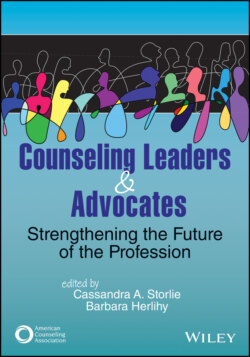Читать книгу Counseling Leaders and Advocates - Группа авторов - Страница 29
MSJCC
ОглавлениеWith the advent of the seventh iteration of the ACA Code of Ethics (ACA, 2014) and the 20/20 definition of professional counseling (Kaplan et al., 2014), AMCD leaders commissioned a task force to update the MCC. Given the history of the MCC, it was important to highlight the philosophical underpinnings of the original document and expand it to fit more current research and scholarship on multi culturalism and social justice (Ratts et al., 2016). Consistent with culturally responsive counseling practices, AMCD leaders and the commission task force noted the importance of drawing from lineage, ancestry, and generational wealth to reflect the values, expertise, and foundation instilled from past leaders (Singh, Nassar, et al., 2020). To fit more cohesively with the introduction of the fifth force of counseling as social justice (Ratts & Pedersen, 2014), the MCC transformed into the MSJCC to accurately reflect a more action-oriented set of values for practice and solidarity with historically marginalized communities. The MSJCC moved beyond a predominant focus on multicultural communication strategies, intercultural dialogue, and cross-cultural skills to a global enterprise predicated on action, systemic change, and advocacy (Fickling et al., 2019; Ratts et al., 2016).
The model of the MSJCC intentionally connected to the MCC (Sue et al., 1992) and the ACA Advocacy Competencies (Lewis et al., 2003; Toporek & Daniels, 2018), and the newly minted MSJCC added multiple aspects to broaden the application of social justice to reinforce its priority for training and practice within professional counseling. The MSJCC incorporated philosophical underpinnings of intersectionality theory to properly reflect the simultaneous coexistence of privilege and oppression and the multiplicity of dimensions beyond race and ethnicity, including sexual identity, affection, ability status, spirituality, social class, and gender identity (Chan et al., 2018; Ratts et al., 2016; Singh, Appling, & Trepal, 2020). Annexing intersectionality theory to the MSJCC served as a response to critics claiming that multiculturalism was predicated solely on race and ethnicity. The underlying characteristics that define intersectionality are power and social context (Collins, 2015; Collins & Bilge, 2020), and counselors need to consider each context and relationship (e.g., counselor and client) as a reflection of power relations. The MSJCC also explicitly infused action as a domain within the previous tripartite model of attitudes and beliefs, knowledge, and skills. Hence, the MSJCC reinforced the development of multicultural competence, social justice in counseling, and culturally responsive practices as a lifelong commitment rather than a status to achieve or a checklist to complete (Ratts et al., 2016).
